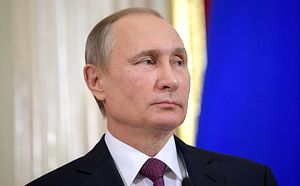As The Diplomat asked earlier: why is Russia denying that North Korea successfully tested an intercontinental ballistic missile (ICBM) on July 4, 2017? North Korea is also asking the same question, and is apparently furious about Russia’s denial.
On July 4, North Korea successfully flew an ICBM, the Hwasong-14. The ICBM launch was acknowledged around the world including United States, Japan, and South Korea — but not Russia. Rather than calling the missile an ICBM, Russia insisted that the missile was only an intermediate-range ballistic missile (IRBM), based on data collected by Russia’s radar systems.
On August 9, the Korean Central News Agency (KCNA) — the state news agency of North Korea — hit back. KCNA published an article “Is Russia Sightless or Is It Mimicking the Blind,” written by a researcher of the Institute for International Studies of the DPRK. The article rebuked Russia’s “far-fetched assertion” and demanded Russia to drop its “big power concept.”
In the article, the researcher first explained North Korea’s big success in launching the ICBM, which made “the whole world turn its eyes to [North] Korea with admiration.” However, when “the international community was unanimous in commenting in high terms” on North Korea’s ICBM — even the “empire of evil,” the United States, “dares not deny the fact,” the article noted — Russia is “feigning blind and deaf” and calling the ICBM a “medium-range ballistic rocket with 681 km of height and 732 km of distance. ”
Then the North Korean author raised the “big question” (just like The Diplomat once did): why is Russia denying the “stark fact unanimously acknowledged by the world community?!”
The North Korean author’s reasoning is very unique. According to the article, Russia’s ICBM denial stems from the big power Russia’s “perversity and jealousy” toward North Korea’s success. According to Russia’s logic, the author wrote, a “big country’s rifle should be regarded as a rocket and small country’s rocket should be taken as a rifle.” The author further condemned Russia’s hypocrisy in taking a strong stand toward U.S. demands for North Korea sanctions in the beginning before eventually boarding the U.S. ship against North Korea in the end.
Finally, the author claimed: “The far-fetched assertion of Russia has become an engine that heartened the DPRK to work for more launches of ICBM and compelled it to take new measures of action.”
Besides the interesting points proposed by the author, the timing of the article is also noteworthy. KCNA used to publish “positive” information about Russia, such as “Kim Jong-un‘s Work Published in Russia,” or “Kim Jong-un Praised by Media of Russia,” or “Kim Il-sung and Kim Jong-il Praised by Russian Figures.” KCNA’s stunning change of attitude toward Russia seems to be connected with Russia’s support for the new sanctions against North Korea.
Regardless, the article shows that, in terms of the question “why is Russia denying North Korea’s ICBM launch?” North Korea is just as curious as the international community.

































